MAD: An eye-opening adventure
By Deb Fox | Wycliffe Today Autumn 2024
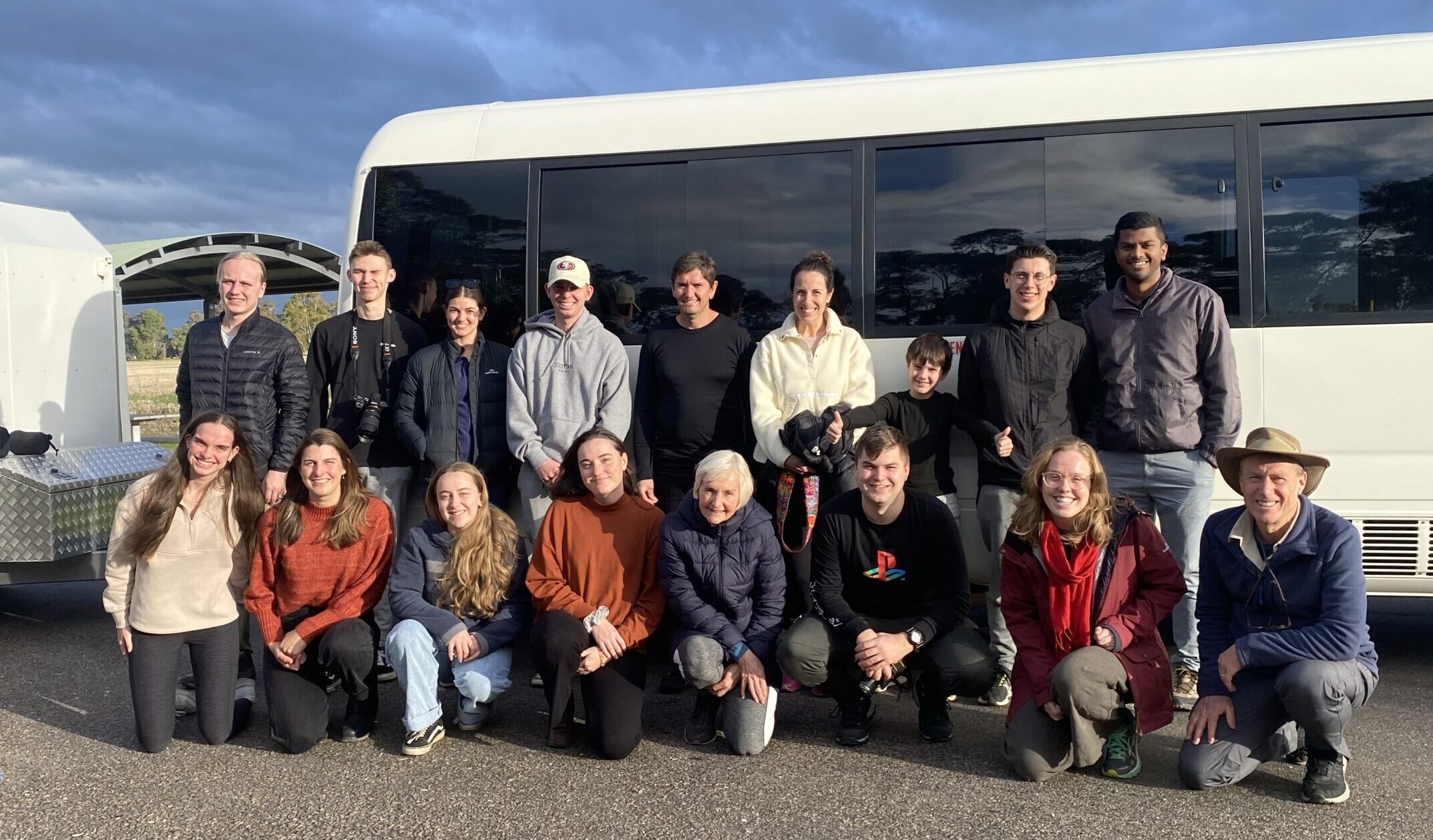 Wycliffe Australia runs MAD (Ministry, Adventure and Discovery) short-term trips that provide an opportunity to visit Indigenous Australian communities where Bible translation, Scripture engagement and gospel work is taking place. David and Lyn Wake, along with Lyn and the late Chester Street, have been bringing teams in a bus from Melbourne to a number of locations throughout Northern and Central Australia since the MAD trips began in 1998. They are always amazed by what God does to bring the teams together and reflect his heart for Indigenous communities to understand his Word in the languages they understand best.
Wycliffe Australia runs MAD (Ministry, Adventure and Discovery) short-term trips that provide an opportunity to visit Indigenous Australian communities where Bible translation, Scripture engagement and gospel work is taking place. David and Lyn Wake, along with Lyn and the late Chester Street, have been bringing teams in a bus from Melbourne to a number of locations throughout Northern and Central Australia since the MAD trips began in 1998. They are always amazed by what God does to bring the teams together and reflect his heart for Indigenous communities to understand his Word in the languages they understand best.
This MAD trip was much like what I had heard from others who had done the trip before me. The first outcome for me was getting an in-depth understanding of the heart for reaching the Aboriginal communities with the good news of Jesus Christ. Secondly, the depth of relationship with fellow MADites, sharing with each other our journey of faith. I would certainly recommend this trip to others.
–Johann
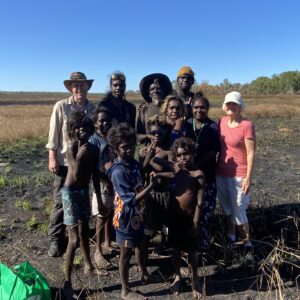 Many times I was out of my comfort zone. It was eye-opening entering the first Aboriginal community in the sort of environment that ordinarily I would not have entered. Team leader, David Wake, made contact with the local pastor and was sitting with him. I decided to reach out and join the gathering. What I discovered was a pastor with a real heart for his people and their welfare. I discovered the challenges of getting appropriate health care in such an isolated community. We were able to pray for the people of the community and share our spiritual journeys. It was a wonderful experience that I am glad that I had the opportunity to be a part of. I would have totally missed what God had in store for me if I had not been able to go.
Many times I was out of my comfort zone. It was eye-opening entering the first Aboriginal community in the sort of environment that ordinarily I would not have entered. Team leader, David Wake, made contact with the local pastor and was sitting with him. I decided to reach out and join the gathering. What I discovered was a pastor with a real heart for his people and their welfare. I discovered the challenges of getting appropriate health care in such an isolated community. We were able to pray for the people of the community and share our spiritual journeys. It was a wonderful experience that I am glad that I had the opportunity to be a part of. I would have totally missed what God had in store for me if I had not been able to go.
–Andrew
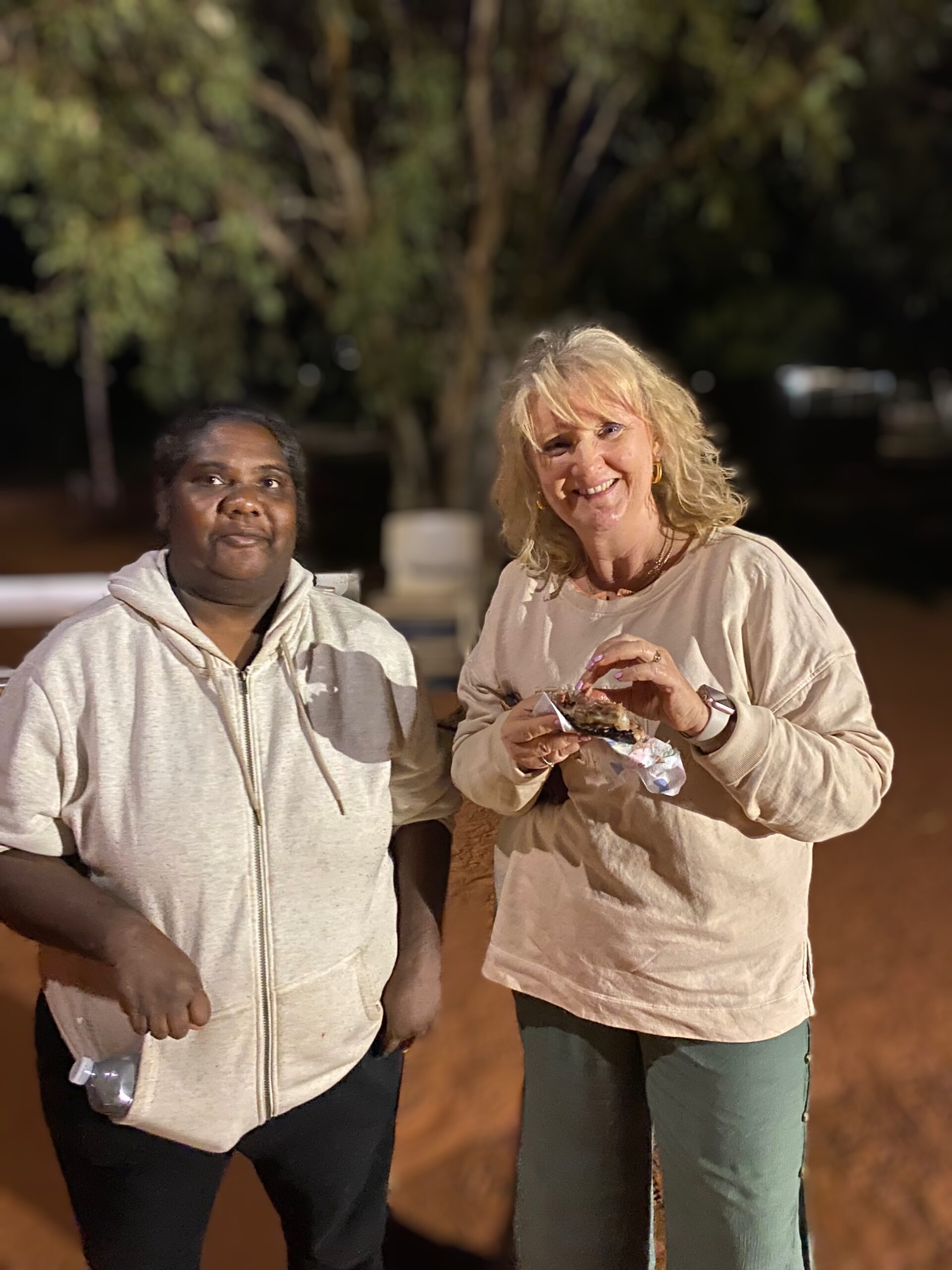 A highlight for me was to visit parts of Australia where less than 0.001% of the population has ever been, such as Canteen Creek. I loved connecting with the people there. We live in pristine houses with manicured gardens, yet we don’t know who our neighbours are or what our heritage is beyond a few generations. In stark contrast, Aboriginal communities are all about relationships. It was great to experience how Bible translation is helping people understand who God is and allowing his Spirit to effect change in hearts. The trip changed my perspective from a cerebral discussion about communities far away to a heart-warming experience and a deeper empathy for my fellow Australians.
A highlight for me was to visit parts of Australia where less than 0.001% of the population has ever been, such as Canteen Creek. I loved connecting with the people there. We live in pristine houses with manicured gardens, yet we don’t know who our neighbours are or what our heritage is beyond a few generations. In stark contrast, Aboriginal communities are all about relationships. It was great to experience how Bible translation is helping people understand who God is and allowing his Spirit to effect change in hearts. The trip changed my perspective from a cerebral discussion about communities far away to a heart-warming experience and a deeper empathy for my fellow Australians.
–Stewart
The 2024 MAD trip is designed for Chinese speakers to learn more about Bible translation taking place in Indigenous Australian communities. It is planned for 23 September – 5 October 2024. For more information, visit https://wycliffe.org.au/events/go-mad-ch/. For enquiries about 2025 MAD trips, please contact https://wycliffe.org.au/eventtype/mad/.
Photos: David Wake and Stewart Henderson
Bible Translation in Australia
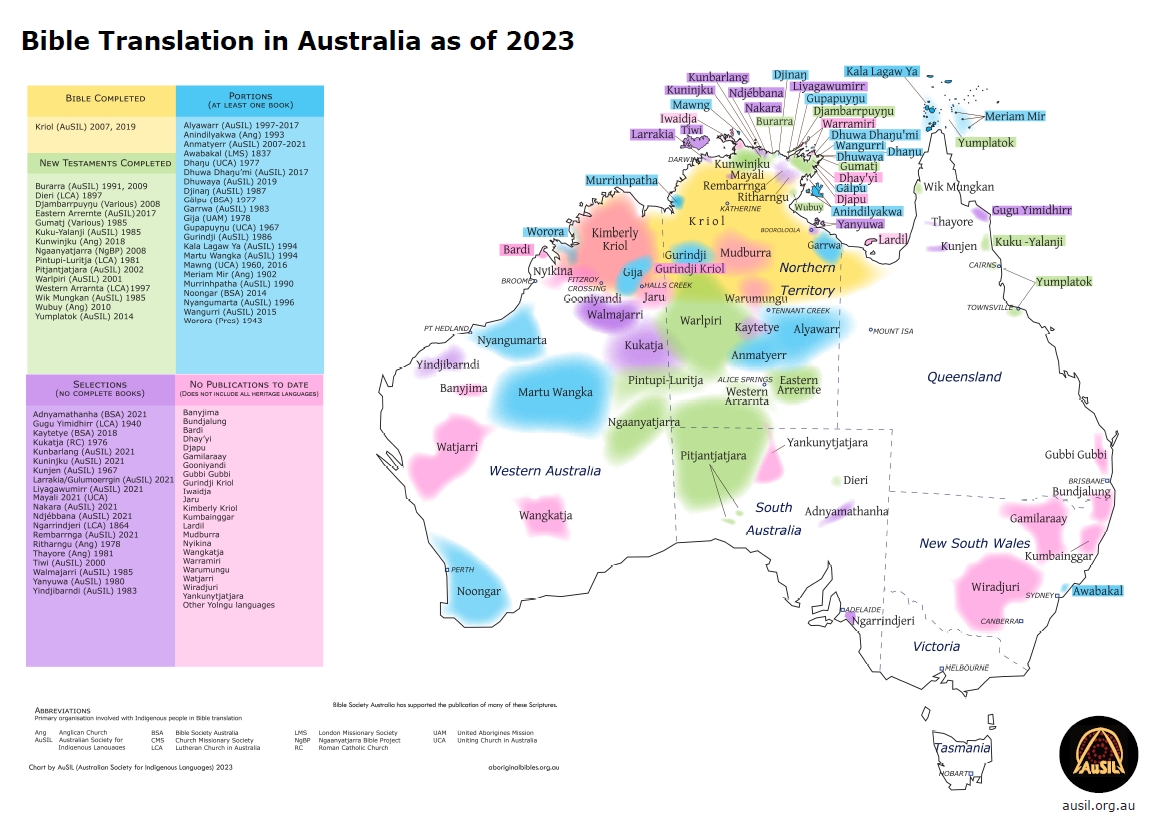
Creatively telling God’s story

Image by Gary McMaster
By Deb Fox | Wycliffe Today Winter 2023 |
Ethnoarts or ‘ethnic arts’ enable language communities to tell stories using artforms from their culture, whether that be symbols, images, music, drama or dance. Lucy Rogers, along with her husband Alan, has been leading songwriting workshops with Indigenous communities since the late 1980s to help them connect with and share God’s story of love and redemption.
Lucy explains:
Communication is more than just language – the arts carry so much more meaning! Song and dance are very strong media for sharing the gospel in Indigenous culture. God made each one of us and put us where we are for a reason. Just because you become a believer, it doesn’t mean you have to throw your culture away. Our role is to help communities determine ‘What is of God and what is not of God? What is good that you can use from your own art forms to tell his story?’
At a Katherine Christian Convention a few years ago, women from the Warlpiri language in the Tanami Desert, northwest of Alice Springs, shared a dance that they had created. Lucy says:
The [Warlpiri] ladies felt it was important to create a dance to tell the gospel to their older people. They decided to do the Parable of the Ten Virgins [Matthew 25:1-13] but one of the older ladies – who was not a Christian at the time – wanted to create a dance that explained why Jesus was on the cross. In the process of talking about what repentance means and what it looks like to follow Jesus, the lady who suggested it came to the Lord herself! The dance (which was made in four parts) told the story of feeling sorry for sinning, kneeling before the Lord in repentance, giving their life back to the Lord and dancing away joyfully.
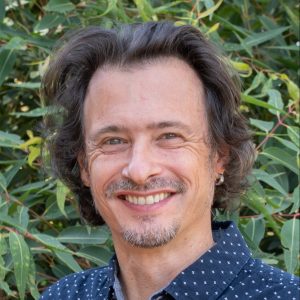
Like Lucy, Peter is a Wycliffe member with a passion for helping cultures use art to understand God better. Through the ‘Arts for a Better Future’ program in Dallas, Peter trains cross-cultural workers with the tools they need for working in language communities to research what artforms are suitable for storytelling. Peter also has experience leading ethnoarts workshops in Papua New Guinea, Kenya, the Solomon Islands and Australian Indigenous communities.
Peter recalls a painting workshop north of Alice Springs where 8 Indigenous ladies were working on large canvases to explain the life of Abraham. When they had completed their artworks, passages from Genesis that related to each painting were read out in each person’s language. Peter says:
It’s exciting seeing people start to understand the Scriptures, having encountered God’s Word through an artform like painting. The arts speak innately to their hearts. Seeing artists come to the Lord through encountering the Scriptures in their cultural creative language…there’s really nothing like it.
PRAY:
for more people to help with audio recording and editing that God would provide for the needs of 3 communities waiting for recording of their songs to begin for an ethnoarts workshop Lucy and teachers from Nungalinya College are planning for 2024 for a painting workshop fellow ethnoarts trainer and Wycliffe member, Ming Fang Strickland, is facilitating that God would continue making Scripture come to life through ethnoarts storytelling.
MORE:
Watch stories of Australian Indigenous people sharing their faith at https://www.40stories.org.au/
Australian Indigenous Languages
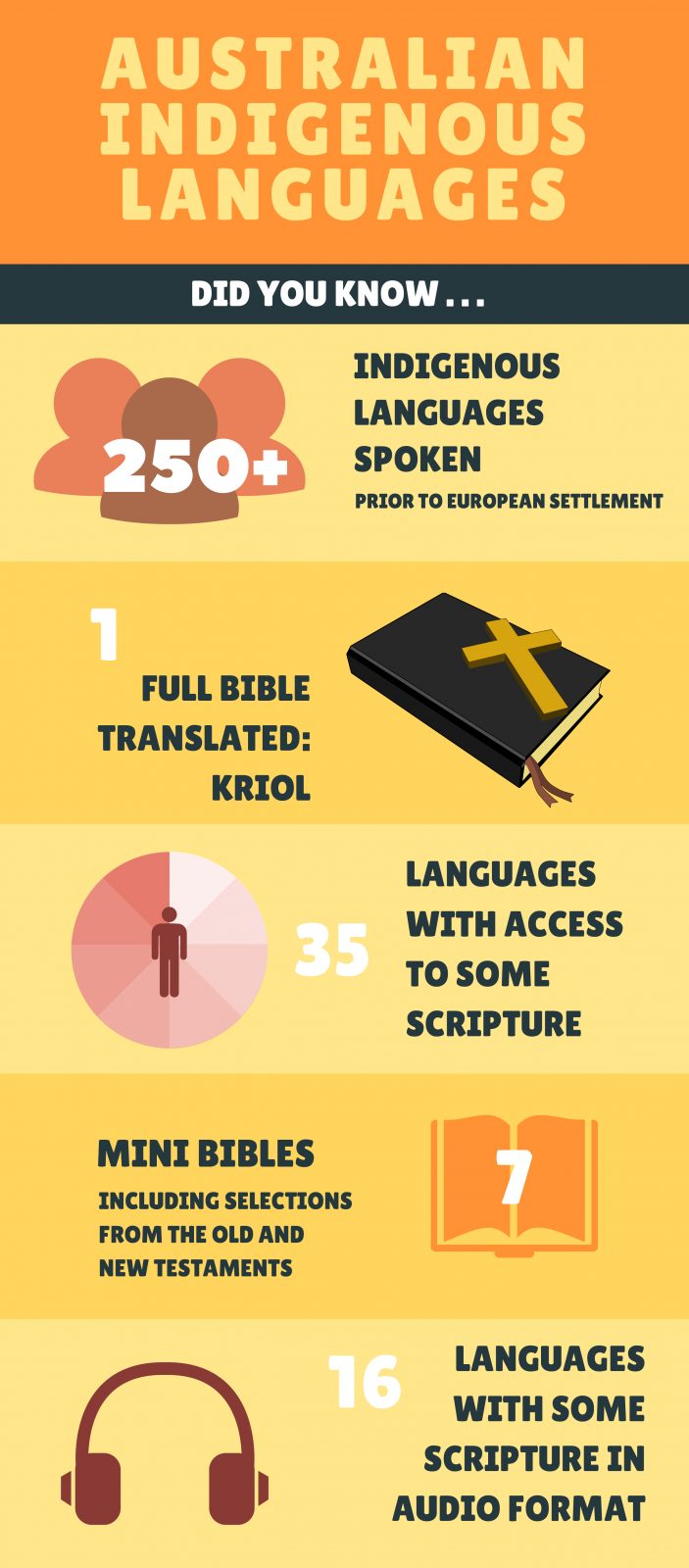
How much do you know about Australian Indigenous Languages?
Test your knowledge here:

Bible beginnings in the back of Burke
 By John Tan
By John Tan
Boorong was the first known Indigenous Australian to have substantial exposure to the Bible. She was sick with smallpox in 1789 when Governor Philip’s men took her to Sydney for treatment. Rev Johnson and his family looked after her for 18 months. Boorong saw the clergyman’s family reading and studying the Bible, and heard him preach from the ‘buk’ on Sundays.[1]
Boorong, like other Aboriginals in that era, encountered the Bible as colonisers tried to educate and ‘civilise’ their communities. Christian missionaries brought the King James Bible into their society, together with other products of European civilisation. Indigenous Australians learned the Bible as they learned English.[2]
The Bible Society started in Australia in 1817, making the Bible available to the public [3]. For non-English readers, they brought in Bibles in Welsh, Hindi, Scottish Gaelic, Russian, Chinese and other languages[4]. They desperately also wanted to get the Bible into indigenous languages.
Lancelot Threlkeld, together with Aboriginal translator Biraban, finished translating Luke’s Gospel into the Awabakal language in 1831. [5] This could be Australia’s first Indigenous Bible translation.[6]
The list of Indigenous languages grew slowly in the 1930s and 1940s.[7] In 1942, when Wycliffe Bible Translators began in the USA, CMS missionary Len Harris and his best students, Grace Yamambu and Bidigainj, translated Bible passages into the Wubuy language of Arnhem Land[8]. Madi, who heard it read at a campfire, was excited that to realise that ‘Jesus speaks Wubuy’[9].
Wycliffe Australia started in 1954, with some of the first translators sent to work in languages overseas in places like the Philippines and PNG. Others formed AuSIL (Australian Society for Indigenous Languages)* and worked in the languages of Bandalang, Burarra, Kuku Yalanji and Wik Mungkan.[10]
Translation efforts picked up in the 1960s and 1970s. The most significant result of this was the Kriol Bible, the first full Indigenous Australian Bible. This Holi Baibul was published in 2007, after about 30 years of work by people from Wycliffe, AuSIL, the Bible Society and the CMS.[11]
*AuSIL has recently changed names to ATG (Australia and Timor Leste Group)
 Wycliffe Australia runs MAD (Ministry, Adventure and Discovery) short-term trips that provide an opportunity to visit Indigenous Australian communities where Bible translation, Scripture engagement and gospel work is taking place. David and Lyn Wake, along with Lyn and the late Chester Street, have been bringing teams in a bus from Melbourne to a number of locations throughout Northern and Central Australia since the MAD trips began in 1998. They are always amazed by what God does to bring the teams together and reflect his heart for Indigenous communities to understand his Word in the languages they understand best.
Wycliffe Australia runs MAD (Ministry, Adventure and Discovery) short-term trips that provide an opportunity to visit Indigenous Australian communities where Bible translation, Scripture engagement and gospel work is taking place. David and Lyn Wake, along with Lyn and the late Chester Street, have been bringing teams in a bus from Melbourne to a number of locations throughout Northern and Central Australia since the MAD trips began in 1998. They are always amazed by what God does to bring the teams together and reflect his heart for Indigenous communities to understand his Word in the languages they understand best.Many times I was out of my comfort zone. It was eye-opening entering the first Aboriginal community in the sort of environment that ordinarily I would not have entered. Team leader, David Wake, made contact with the local pastor and was sitting with him. I decided to reach out and join the gathering. What I discovered was a pastor with a real heart for his people and their welfare. I discovered the challenges of getting appropriate health care in such an isolated community. We were able to pray for the people of the community and share our spiritual journeys. It was a wonderful experience that I am glad that I had the opportunity to be a part of. I would have totally missed what God had in store for me if I had not been able to go.
A highlight for me was to visit parts of Australia where less than 0.001% of the population has ever been, such as Canteen Creek. I loved connecting with the people there. We live in pristine houses with manicured gardens, yet we don’t know who our neighbours are or what our heritage is beyond a few generations. In stark contrast, Aboriginal communities are all about relationships. It was great to experience how Bible translation is helping people understand who God is and allowing his Spirit to effect change in hearts. The trip changed my perspective from a cerebral discussion about communities far away to a heart-warming experience and a deeper empathy for my fellow Australians.






 By John Tan
By John Tan Thanks for your patience...
Thanks for your patience...